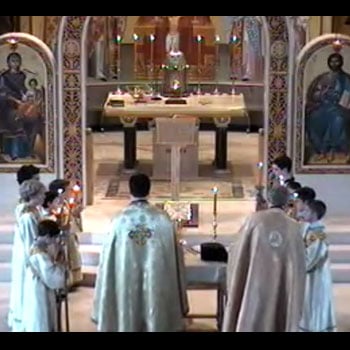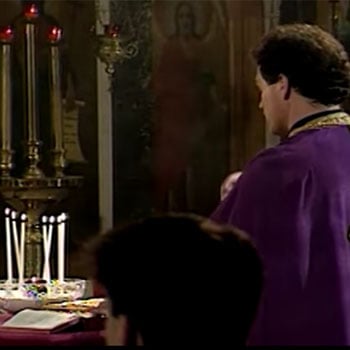Most Orthodox Christians are familiar with this sacrament as the special service offered on Wednesday of Holy Week in preparation for Pascha. Not as many are aware that this service can and should be held regularly in our churches and our homes during fasting periods and on the feast days of healing saints offering the faithful to partake more often of this life-bestowing therapy of the Church, this "touch of Christ." But how do we prepare for this great mystery of our Orthodox Church?
Historically, the sacrament of Holy Unction would follow the sacrament of Holy Confession or Reconciliation and would precede the sacrament of Holy Communion. Therefore it is still appropriate for us to first go to Holy Confession before being anointed with Holy Unction. The acknowledgement and repentance of our sinful tendencies and inclinations prepares the wounds of the heart to more fully receive the balm of Holy Unction and then the medicine of Immortality, Holy Communion.
In order to properly approach the mystery of Holy Unction and benefit most from it, we need, as with all the sacraments, to prepare ourselves. The following are listed as five important though not comprehensive means of preparation for Holy Unction for individuals and families.
Study: The richness of the service of Holy Unction as it has developed over the centuries makes it a true "treasure chest" of inspiration and comfort concerning the Church's understanding of physical and spiritual sickness and healing. Interestingly, very few of the Epistle and Gospel readings speak directly to the topic of physical healing. They present instead a variety of themes that speak to essential aspects of the Christian life including: the necessity of faith, the importance of repentance, works of love, patient endurance in trials, and preparation for the coming judgment. Well known Orthodox scholar and author, Fr. Stanley Harakas, takes up these various themes in a book entitled, Of Life and Salvation. In this book, he offers reflections on living the Christian life based on the seven epistles and gospel readings designated in the Holy Unction service. Perhaps families could read together one of the many readings and reflections offered in the book as means, each time, of preparing for participation in the sacrament. In addition to reading over the text of the service prior to partaking of Holy Unction, it is important to make available for those who do not speak the language(s) used in the service, a copy in their own language to follow.
Fasting: Another way to prepare ourselves for Holy Unction is to fast. Though we normally associate fasting with the sacrament of Holy Communion it is quite appropriate to fast before participation in every sacrament of the Church. Certainly, those who are ailing and in need of physical nourishment or are on a special diet because of their illness are excused from fasting by the Church. They are asked only to receive the sacraments with thanksgiving and a sense of their own unworthiness of God’s love and mercy. But for those who can, fasting is an important means of preparation. How should we fast before Holy Unction? To the best of one’s ability. Those who are able may keep a strict fast from at least 6 hours before the service. Others should at least eat fasting foods being aware not to eat more than necessary. The goal is to assist our ability to concentrate during the service itself and to heighten our sensitivity to God's presence. The Father's state simply, "Fasting brings tears. Eating dries up tears." Parents can modify the fast for their children based on the needs of each child and in consultation with their spiritual father. Avoiding arguments or conflicts with our children over their having to 'do something else that they don’t want', parents can explain that by fasting they will be preparing their bodies, minds, and hearts to meet Christ. In the words of one contemporary elder to a young child’s question about fasting, "If we want to receive Christ, we must give Him something first."
Confession/self-examination: As stated earlier, it is essential that we first confess our sins before participating in Holy Unction. It should be explained and understood that Holy Unction in no way replaces the sacrament of Holy Confession which is the foremost therapy of the Church for the acknowledgment and repentance of our sinful tendencies and habits. It is significant to note that Christ first forgave the paralytic his sins before granting him healing of his paralysis, and St. James writes when discussing the anointing of the sick , "Confess your sins to one another and pray for one another that you may be healed" [James 5:16]. Even if someone has confessed somewhat close in time to their participation in Holy Unction, it is still appropriate, since we sin on a daily basis, to at least make a self-examination of our thoughts, words and deeds since our previous confession, praying to the Lord that He, "help us see our sins so that we may repent of them." This increases our sense of insufficiency, humility, and reliance on God’s strength, and indicates to ourselves what areas of our lives are in most need of healing and correction. As we do for Holy Communion, it is appropriate to seek out others we may have wronged or who have wronged us in some way and ask their forgiveness, seeking to be reconciled with all. We can have our children ask forgiveness of all their family members setting an example for them by asking forgiveness from them first. In all these ways, our children become more aware that something special is about to happen during Holy Unction.
Faith: Often, before healing someone of their disease or handicap Jesus asked them if they believed He could heal them [Mark 5:36; 9:24]. Conversely, we know that in his own country Jesus did not do many works of healing because of their unbelief [Matt. 13:58]. It is important that we prepare ourselves and our families before receiving Holy Unction by asking ourselves the question, "Do I believe that Jesus will heal me through this mystery?" Faith is the most essential ingredient in our experiencing God's healing power. Yet, faith is also a gift from God and through participation in Holy Unction our weak faith can be strengthened. Once Staretz Sophrony from the monastery of St. John the Baptist in Essex, England was asked to visit the hospital bed of a dying man. He had been asked by the man’s wife and mother to come since they believed him to be a holy man and hoped for a miracle. After praying through the prayers for healing and anointing the man more than once, the Staretz said to the dying man, "You see we are not miracle-workers but just sinful men," The man responded however, "Elder, when you came here I was not a believing man. My wife and my mother asked for you to come and I reluctantly agreed. But, as you have been reading the prayers, faith has entered into my heart. I now believe in the Lord and am ready to die." Tears streamed from the eyes of the Elder. Though he had many times witnessed miraculous healings through his humble prayers he was never as happy as at this moment when he witnessed the restoration of faith of the man about to depart this life.
Preparing Our Bodies For Anointing: A final practical way we should prepare ourselves and our family members for Holy Unction is to make certain that we have physically washed our bodies, especially our face and hands. We are coming before the Lord, and offering our bodies to be filled with His Grace—that He may be signed upon us. Do we go to the doctor for a physical without having washed or the dentist without having brushed our teeth? How much more should we be aware of presenting ourselves to the Lord looking the best we can—not fancy, just clean and properly dressed. Wearing something 'nicer' than how we normally dress for school or play also heightens the child’s awareness of Holy Unction being something special. Though we are seeking inner cleansing, it is still helpful to "cleanse the outside of the cup and the dish" while not neglecting our other preparations for inner healing.
Excerpt taken from article Heal the Sick by Fr. Theodore Petrides



